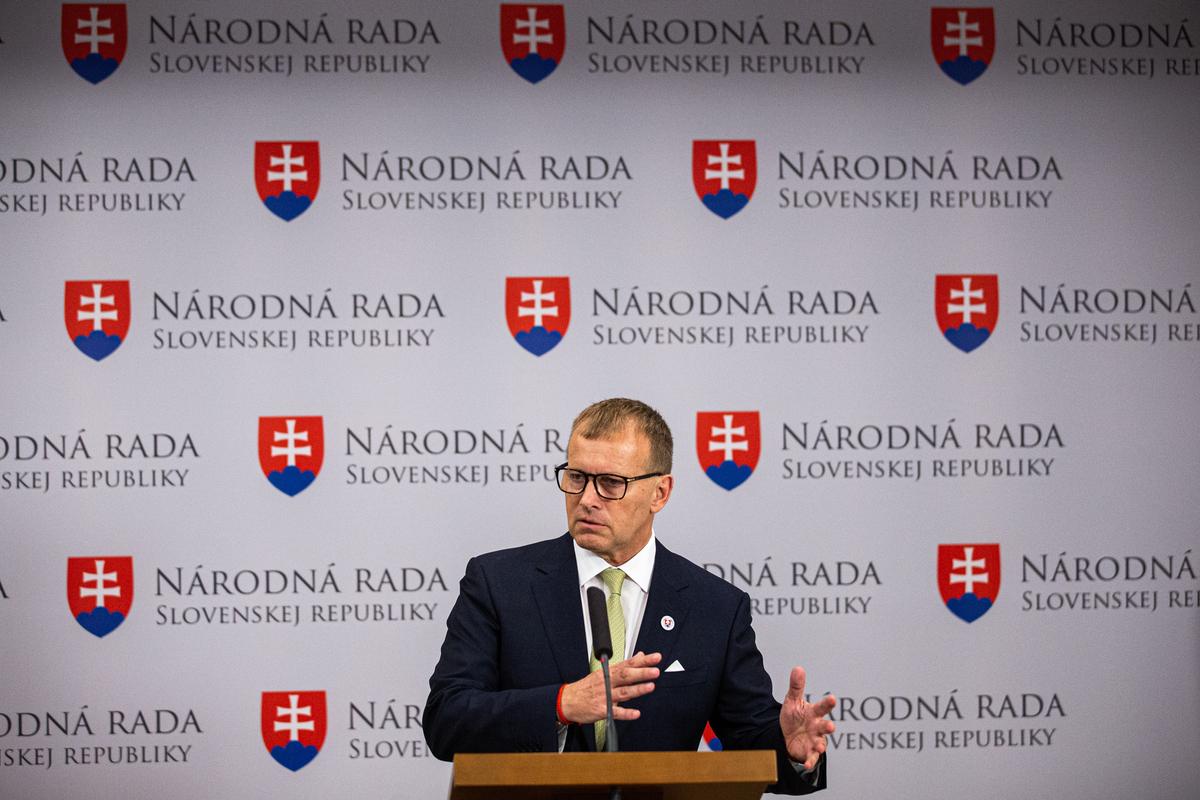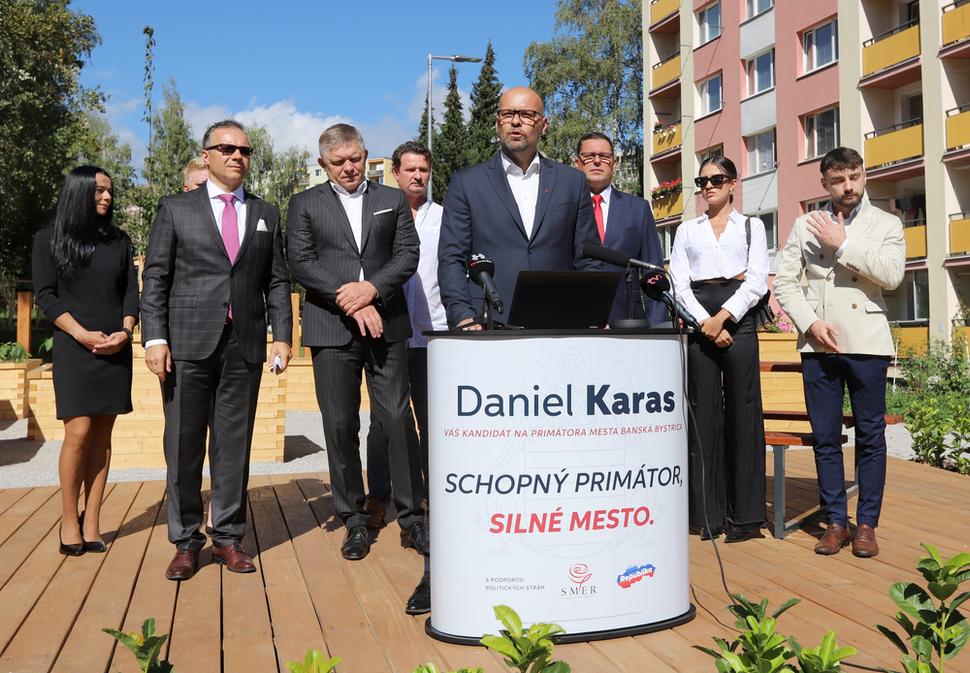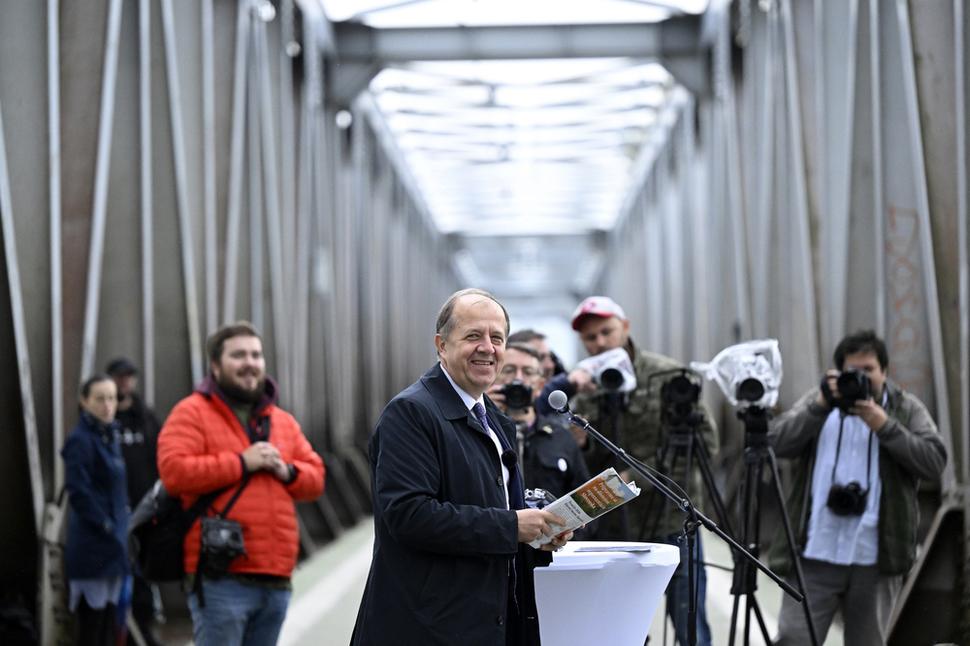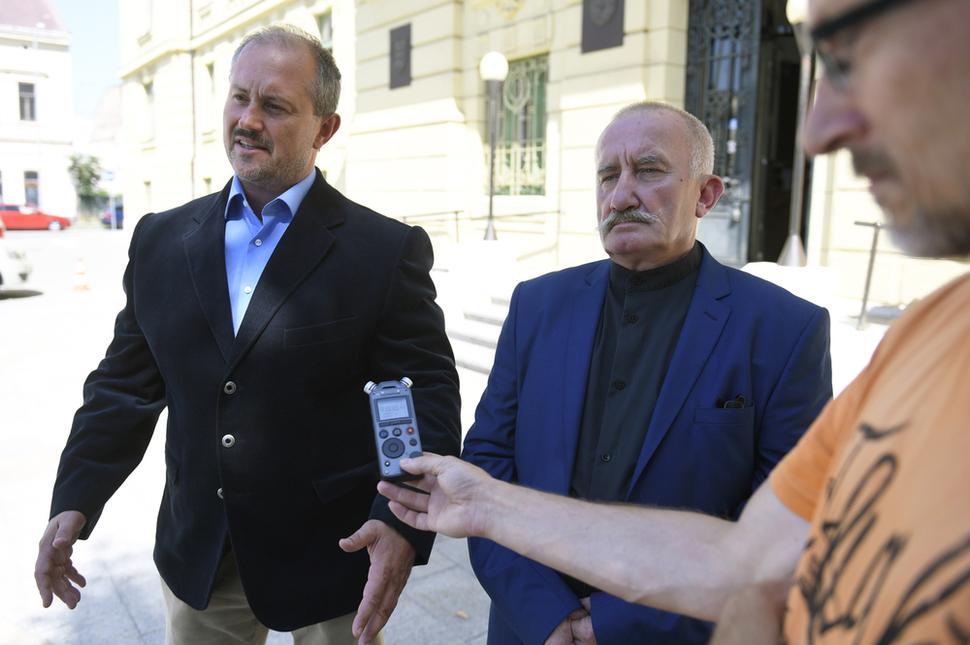In the days before municipal and regional elections on October 29, a far-right candidate for mayor of Banská Bystrica, a large town in central Slovakia, declines all offers to take part in pre-election debates.
Peter Podhorský, self-employed and a member of People’s Party Our Slovakia (ĽSNS), meets local people at food festivals and smiles down at them from billboards instead.
“We’ve already helped the Ukrainians, it’s time to help our people!” his billboard reads.
Though Podhorský’s short programme does not specifically target Ukrainian refugees from the war next door, instead focusing on the homeless and LGBT people, ĽSNS promoted in its newspapers in June the falsehood that Slovakia helps Ukrainian refugees more than other people living in the country, and that the Ukrainians steal jobs.
“They are already replacing Slovaks in many job positions only because they are willing to work for a lower salary,” the party claimed falsely. “If this continues, in the end, people will lose their jobs because of the Ukrainians.”
Slovakia, a country of 5.4 million people, has granted temporary refuge to nearly 100,000 refugees since the start of Russia’s invasion of Ukraine in February. The aversion against Ukrainian refugees has since increased, with most Slovaks believing that the state looks after refugees more than its own citizens, a Focus poll from the summer found.
Yet, another Focus poll, carried out in early October, showed that Podhorský has got little chance of becoming mayor. With just 0.6 percent, the largely unknown candidate came fifth in the poll. The far-right candidate might still be elected regional councillor.
“He’s trying to exploit the topic and arouse a negative attitude towards the Ukrainians among people,” said electoral geographer Tibor Madleňák from Matej Bel University in Banská Bystrica.
Observers claim the war in Ukraine is not a topic in the Slovak municipal and regional elections, which will be held on the same day – October 29 – for the first time, even if they are the first elections to be held in the country since the start of Russia’s invasion.
Slovaks have their own problems
The impacts of the war, like the energy crisis or the surging prices of building materials and food products, are addressed by candidates in different debates or their programmes in how they affect, for example, the energy bills of schools or delay investment projects.
“The attitude towards solving the energy crisis may be one of the factors that will influence the election results,” said political analyst Jozef Lenč from Ss. Cyril and Methodius University in Trnava.
Local and regional governments, however, lack the competences and money to deal with these huge impacts and have to rely on the Slovak government and EU measures.
“Everyone can feel the impacts of the conflict,” noted local and regional politics expert Daniel Klimovský from Comenius University in Bratislava. “It’s impossible to avoid the war.”
The situation may be more difficult in small towns with a high concentration of refugees.
In Gabčíkovo, a town of 5,000 people near the Hungarian border, several hundred Ukrainian refugees live in an old accommodation facility that serves as a humanitarian centre. Klára Tihláriková, a team leader of the Mareena civic organisation that helps in the centre, told the Denník N daily in late August that local services were not expanded in the town after the arrival of refugees. As a result, local people experienced longer queues at the post office or overcrowding on public transport. Placing refugee children in schools was another problem that surfaced.
“That’s why some people complained,” she admitted, noting that a lot of good people helped them too.
This is not the first time that local people have lived with refugees side by side. In 2015, during the migration crisis, people in Gabčíkovo rejected the placement of hundreds of refugees who had applied for asylum in Austria and were supposed to stay at a facility in the Slovak town temporarily, in a local referendum. Refugees stayed there for two years.
“In some municipalities the Ukrainian crisis might thus be a key topic because of their citizens,” Klimovský opined.
Today, it is not rare for the Ukrainians to be the victims of verbal attacks by people in Slovakia.
Even though Gabčíkovo is 80 percent Hungarian and Hungarian Prime Minister Viktor Orbán’s government has invested a lot of money in southern Slovakia in recent years to strengthen Slovak Hungarians’ awareness of their belonging to the Hungarian minority, experts do not think the politics of the pro-Russian Hungarian prime minister and his right-wing Fidesz party will have a significant influence on the decision of Slovak Hungarians in the elections.
“They are a heterogenous group and, of course, some will adopt Fidesz’s narratives,” said the expert.
Despite the massive inflow of refugees in the early stages of the conflict, the war should not decide the results in the Slovak regions near the border with Ukraine, reckons political analyst Alexander Onufrák from Pavol Jozef Šafárik University in Košice. So far, around 900,000 refugees have entered Slovakia through the Slovak-Ukrainian border.
“Towns and region, and people in them, face problems other than the conflict,” said the expert, pointing to a brain drain, shortage of doctors, low wages, lack of job opportunities, and no highways to Poland and Ukraine. “Some towns do not even have a grocery store. Availability is a disaster.”
Local and regional topics indeed dominate the debates across the country.
According to Lenč, the war could be a major topic in the elections only if Slovakia would experience another big migration wave, which is not the case today.
Lacklustre ĽSNS
In the Slovak municipal and regional elections, voters tend to base their selection of mayors, chairs of eight self-governing regions, and local and regional councillors on their personal experience with candidates. However, voters do not often know candidates and their opinions, for example, on the war at all.
UK national Heather Dawn Zavaďák-Wyche, who lives in Košice and will vote in the elections for the first time, considers the candidates’ views on the war to be important to her.
“It’s a big deal for me,” she said, “Are they supportive of Russia or not? A big no if they are, of course.”
Her Slovak husband helps her choose the right candidates from a pool of too many candidates.
Whether candidates are pro-Russian or pro-Ukrainian will not be a key factor that will shape people’s decisions, Lenč thinks, unless they are Ukrainians with the right to vote.
“Others will vote a candidate from their own ‘bubble’,” he added.
The parties that decide to support a candidate give voters a useful hint at how the candidate see the world.
For example, the far-right parties ĽSNS and Republika, a few smaller nationalist parties, as well as the second strongest parliamentary party Smer led by ex-prime minister Robert Fico have long criticised Slovakia’s military support of Ukraine and anti-Russian sanctions, blaming them for the current crises.
Smer and Republika, a party formed last year of ĽSNS renegades led by MEP Milan Uhrík, created tens of local and regional coalitions ahead of the elections, even though Smer claimed in 2017 they would act as “a dam against extremism”. For instance, their joint mayoral candidate in Banská Bystrica, local councillor Daniel Karas, is more popular than Peter Podhorský, a candidate of the declining ĽSNS led by convicted ex-MP Marian Kotleba.
Still, Karas is unlikely to win.
Kotleba presided over the Banská Bystrica Region from 2013 to 2017. Nevertheless, in 2017 and 2018 his party did not fare well in the regional and municipal elections, winning only a handful of councillor seats and one mayoral seat. ĽSNS is estimated to achieve a similar result in 2022, but not only due to a split in the party.
“The problem of far-right parties is their electorate is fixed to strong leaders, while others are not recognisable,” said Madleňák.
Kotleba cannot run for any office following his conviction.
Even the controversial and strongly pro-Russian singer Martin Jakubec, who wants to become the Bratislava mayor with the support of ĽSNS, looks unlikely to succeed in this year’s municipal elections. His support stands at 0.5 percent, according to a new Focus poll, while the incumbent mayor Matúš Vallo tops the poll. Also, the notorious and convicted MP Milan Mazurek from Republika will most likely not replace Milan Majerský as president of the Prešov Region given his low support measured in the latest AKO poll.
“The majority electoral system prefers candidates who are established in the region and have something to offer,” said Klimovský.
He added that a low turnout, which was the case in previous years especially in the regional elections, and devoted far-right voters may still help far-right parties gain some councillor seats in the end.
A Ukrainian runs
Unlike Jakubec, Olesya Besaraba, a Ukrainian from Kyiv, does not have any ambition to become mayor. Instead, she decided to run for local councillor in Žilina, northern Slovakia. She has lived there for more than a decade.
Foreigners who hold permanent residence can also be elected as councillors. Yet it barely happens. If Besaraba wins, she would become the first known Ukrainian to serve as councillor.
Verbal attacks or hateful messages that she receives – for example, for speaking Ukrainian or Slovak with a Ukrainian accent on the street – have not stopped her. She says she’s used to them by now.
“The town is not ready for someone who does not speak Slovak,” the candidate said, noting the number of foreigners in the town will continue to rise in the future.
One of the focuses in her campaign is therefore the integration of foreigners, a topic largely avoided by politicians.
Besaraba realises she may not win a seat on the local council this time, but she is at least hoping people will acknowledge that a foreigner can still run for office and help the town and its community.
“In the next elections, who knows, a foreigner settled in Žilina will have a chance to succeed,” she said.
This story was produced in partnership with Reporting Democracy, a cross-border journalism platform run by the Balkan Investigative Reporting Network.


 Speaker Boris Kollár (Sme Rodina) announces on June 6, 2022 the date on which the 2022 municipal and regional elections will be held. (source: SME - Marko Erd)
Speaker Boris Kollár (Sme Rodina) announces on June 6, 2022 the date on which the 2022 municipal and regional elections will be held. (source: SME - Marko Erd)
 Daniel Karas announced his candidacy for the Banská Bystrica mayor on September 9, 2022. He is supported by Smer, a former ruling party, and Republika, a far-right party. (source: TASR - Ján Krošlák)
Daniel Karas announced his candidacy for the Banská Bystrica mayor on September 9, 2022. He is supported by Smer, a former ruling party, and Republika, a far-right party. (source: TASR - Ján Krošlák)
 The picture shows the incumbent mayor of Trenčín Richard Rybníček during the press conference at which he announced his re-candidacy for the post of mayor of Trenčín on September 27, 2022 on the old railway bridge in Trenčín. (source: TASR - Radovan Stoklasa)
The picture shows the incumbent mayor of Trenčín Richard Rybníček during the press conference at which he announced his re-candidacy for the post of mayor of Trenčín on September 27, 2022 on the old railway bridge in Trenčín. (source: TASR - Radovan Stoklasa)
 From left: chairman of the ĽSNS party Marian Kotleba and candidate for chairman of the Košice Self-Governing Region for the People’s Party Our Slovakia (ĽSNS) Stanislav Mizík in Košice on August 26, 2022. (source: TASR - František Iván)
From left: chairman of the ĽSNS party Marian Kotleba and candidate for chairman of the Košice Self-Governing Region for the People’s Party Our Slovakia (ĽSNS) Stanislav Mizík in Košice on August 26, 2022. (source: TASR - František Iván)